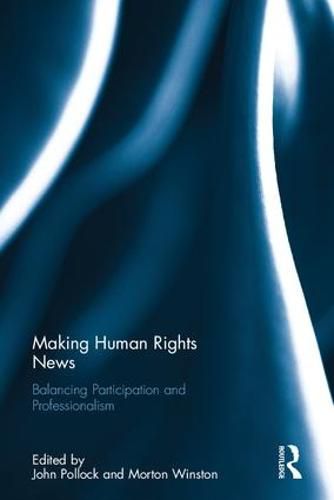Readings Newsletter
Become a Readings Member to make your shopping experience even easier.
Sign in or sign up for free!
You’re not far away from qualifying for FREE standard shipping within Australia
You’ve qualified for FREE standard shipping within Australia
The cart is loading…






Making Human Rights News: Balancing Participation and Professionalism explores the impact of new digital technology and activism on the production of human rights messages. It is the first collection of studies to combine multidisciplinary approaches, citizen witness challenges to journalism ethics, and expert assessments of the liberating role of the Internet, addressing the following questions:
What can scholars from a wide range of disciplines - including communication studies, journalism, sociology, political science, and international relations/studies - add to traditional legal and political human rights discussions, exploring the impact of innovative digital information technologies on the gathering and dissemination of human rights news?
What questions about journalism ethics and professionalism arise as growing numbers of untrained citizen witnesses use modern mobile technology to document claims of human rights abuses?
What are the limits of the liberating role of the Internet in challenging traditional sources of authority and credibility, such as professional journalists and human rights professionals?
How do greater Internet access and human rights activism interact with variations in press freedom and government censorship worldwide to promote respect for different categories of human rights, such as women’s rights and rights to health?
This book was originally published as a special issue of the Journal of Human Rights.
$9.00 standard shipping within Australia
FREE standard shipping within Australia for orders over $100.00
Express & International shipping calculated at checkout
Making Human Rights News: Balancing Participation and Professionalism explores the impact of new digital technology and activism on the production of human rights messages. It is the first collection of studies to combine multidisciplinary approaches, citizen witness challenges to journalism ethics, and expert assessments of the liberating role of the Internet, addressing the following questions:
What can scholars from a wide range of disciplines - including communication studies, journalism, sociology, political science, and international relations/studies - add to traditional legal and political human rights discussions, exploring the impact of innovative digital information technologies on the gathering and dissemination of human rights news?
What questions about journalism ethics and professionalism arise as growing numbers of untrained citizen witnesses use modern mobile technology to document claims of human rights abuses?
What are the limits of the liberating role of the Internet in challenging traditional sources of authority and credibility, such as professional journalists and human rights professionals?
How do greater Internet access and human rights activism interact with variations in press freedom and government censorship worldwide to promote respect for different categories of human rights, such as women’s rights and rights to health?
This book was originally published as a special issue of the Journal of Human Rights.